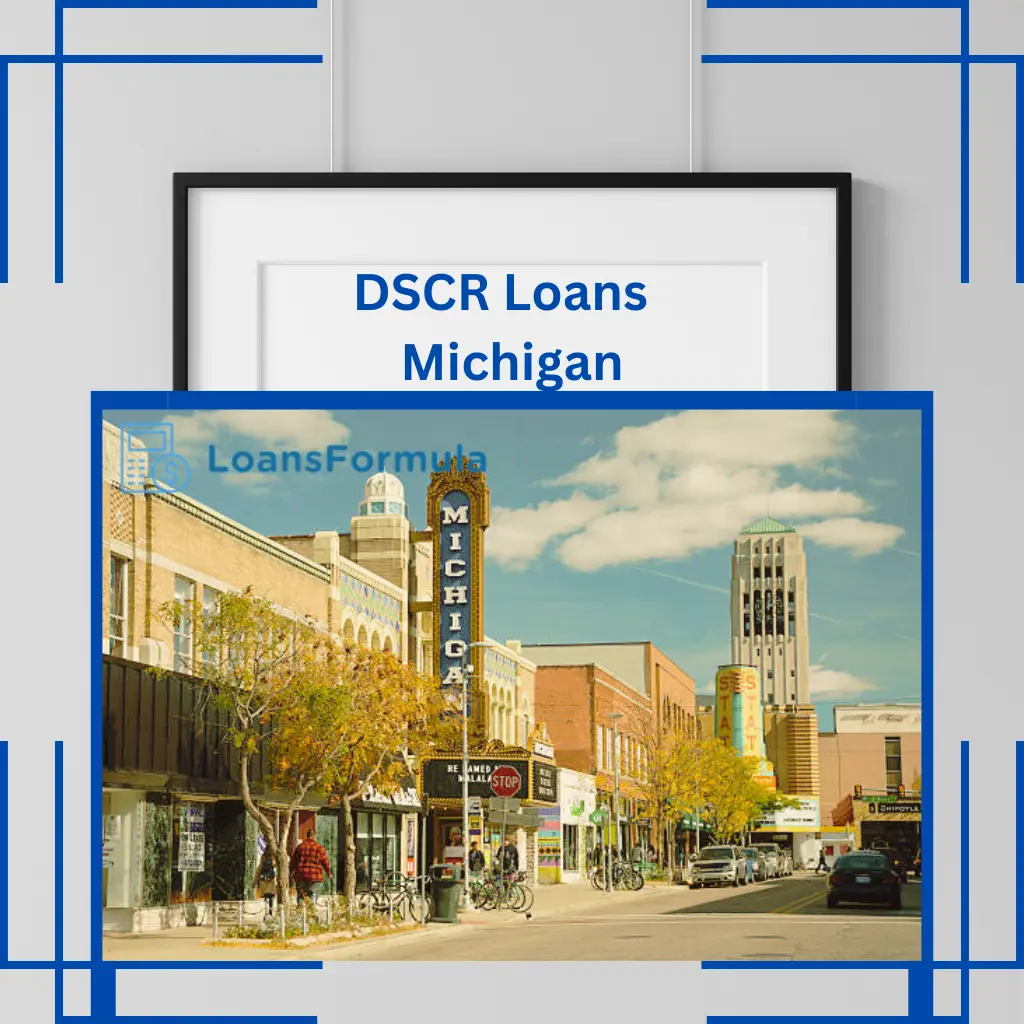DSCR Loans in Michigan: Your Comprehensive Guide [2024]
Are you a real estate investor in Michigan looking to secure financing for a rental property using a DSCR loan? If the answer is yes, then you’ve come to the right place! This guide is the go-to resource for finding a lender that offers DSCR loans in Michigan.
In this article, we’ll cover everything you need to know about DSCR loans in Michigan. We’ll explain how lenders use them to evaluate long-term rental properties and we’ll compare different lenders in Michigan who provide DSCR loans. By the end of this comprehensive guide, you’ll have all the information you need to make an informed decision on which lender to choose for your rental property investments.
So, let’s jump right in and explore all the ins and outs of DSCR loans in Michigan!
What is a DSCR Loan in Michigan?
A DSCR loan is a financing option specifically designed for investment properties in Michigan. It enables borrowers to secure a loan based on their ability to generate sufficient rental income from the property to cover loan payments. Lenders typically require a minimum debt service coverage ratio (DSCR) of at least one or higher, ensuring that the rental income is adequate to meet the loan obligations.
When applying for a DSCR loan in Michigan, lenders commonly consider factors such as the property’s income, a thorough analysis of net operating income (NOI), the borrower’s credit score, and other relevant criteria.
Additionally, DSCR lenders may stipulate a minimum down payment of 20-25% as a requirement to obtain the DSCR loan, further securing the investment.
With the DSCR Loan in Michigan, borrowers can finance their investment properties by leveraging the property’s rental income and meeting the lender’s criteria for a successful loan application.
Benefits of DSCR Loans in Michigan for Real Estate Investors
Michigan’s booming real estate market presents excellent opportunities for investors, and DSCR loans offer a convenient financing option. Let’s delve into the advantages of DSCR loans for real estate investors in Michigan.
Example: Crunching the Numbers
Imagine you’re considering a property worth $300,000 in Michigan. With a 20% downpayment and a 7% interest rate over a 30-year term, let’s factor in the average rental income of $3,200 and standard expenses of $500. Plugging these figures into the DSCR formula—Net Operating Income / Debt Obligations—you arrive at a solid Debt Service Coverage Ratio of 1.69. This indicates a healthy income-to-debt ratio, making loan approval highly likely.
No Tax Returns Required
One notable advantage of DSCR loans in Michigan is that real estate investors are not required to submit tax returns or extensive financial documentation. This accessibility makes DSCR loans an attractive financing option for real estate investments.
Quick Approval
Compared to conventional loans, DSCR loans boast faster approval times. This expedited process enables real estate investors to swiftly close their investment deals and seize lucrative opportunities.
Asset-Based Lending
DSCR loans allow investors to borrow against a property’s monthly rental income rather than relying solely on personal income or available cash. This asset-based approach provides flexibility and empowers investors to leverage their rental income effectively.
Wide Range of Lenders
Michigan offers a variety of lenders providing DSCR loans, allowing real estate investors to choose one that aligns with their specific needs and budgetary considerations. This diverse selection ensures investors can find favorable terms and competitive rates.
Favorable Cash Flow
By utilizing rental income as collateral instead of personal finances, real estate investors can maintain a healthy cash flow while expanding their property portfolios. This financial stability contributes to sustainable growth and success in real estate investments.
Long-Term Financing
DSCR loans provide real estate investors in Michigan with long-term financing options. This extended financing period enables investors to focus on acquiring and managing rental properties over an extended period, fostering consistent returns.
A DSCR loan is particularly beneficial for purchasing a second rental property, as many of our clients have experienced. This financing solution has helped them kickstart their real estate investment journey.
Now that we’ve explored the advantages of DSCR loans, let’s delve into the typical loan terms offered by lenders and the eligibility criteria for securing these loans in Michigan.
Eligibility Requirements and Loan Terms for DSCR Loans in Michigan
To qualify for a DSCR loan in Michigan, there are certain criteria that every borrower must meet. Let’s take a closer look at the requirements you need to fulfill:
- DSCR Ratio: You must have a DSCR ratio of 1 or more. This ratio indicates your property’s ability to generate sufficient income to cover the loan payments.
- Credit Score: A minimum credit score of 620 or higher is required to be eligible for a DSCR loan. This helps lenders assess your creditworthiness and repayment capacity.
- Down Payment: You’ll need to provide a down payment ranging from 20% to 25% of the property’s value. This ensures that you have a stake in the investment and reduces the lender’s risk.
What does a DSCR loan in Michigan actually cover in terms of financial obligations?
Generally, these loans encompass mortgage payments, property taxes, insurance premiums, and other expenses related to the property.
Moreover, some lenders may even allow borrowers to utilize the loan proceeds for home improvements or renovations that can potentially enhance the value of the property.
When it comes to the loan-to-value (LTV) ratio, it typically ranges between 70% and 80%. This means that property investors have the opportunity to borrow up to 80% of the property’s estimated market value.
Such ratios not only provide assurance to lenders against the risk of defaulting borrowers but also empower property investors with greater purchasing power when it comes to investment properties.
Special Considerations for Older Properties and Location Restrictions
When it comes to DSCR loans in Michigan, it’s crucial to keep in mind that not all investment property locations are eligible. Lenders may have specific restrictions on loan amounts and terms based on factors such as the property’s age, condition, and location.
For instance, older properties might qualify for only up to 70% of their estimated market value. Moreover, the lender may require a larger down payment as a condition for securing the loan.
Additionally, it’s worth noting that certain lenders may have limitations on funding loans in particular locations due to local zoning regulations or other restrictions. As a result, property investors must conduct thorough research on their target property’s location before applying for DSCR loans.
Steps to Get DSCR Loans in Michigan
Getting a DSCR loan in Michigan is a step-by-step process that can be easily navigated. Here’s a breakdown of each step involved:
Find the DSCR Lender
Start by researching and identifying lenders in Michigan who offer DSCR loans. Look for reputable institutions or lending platforms that specialize in real estate financing. You can seek recommendations from fellow investors or explore online resources to find potential lenders.
Apply For DSCR Loan
Apply Once you have chosen a suitable lender, it’s time to initiate the application process. Fill out the required forms and provide the necessary documentation, such as personal and financial information. The lender may also require details about the property you intend to finance.
Submit Proof of Income from Your Property
To support your loan application, you’ll need to provide proof of income generated by the property you plan to finance. This can include rental income statements, lease agreements, or any other relevant documentation that demonstrates the property’s cash flow potential.
DSCR Calculation and 1007 Rent Schedule
The lender will assess the Debt Service Coverage Ratio (DSCR) for your property. This involves analyzing the property’s net operating income (NOI) and comparing it to the proposed loan payments. The lender may also require a 1007 Rent Schedule, which details the estimated rental income and expenses associated with the property.
Closing
If your loan application is approved and all necessary evaluations are completed, it’s time for the closing stage. During this step, you’ll sign the loan agreement and any other required documents. The lender will disburse the funds, and you can proceed with your investment plans.
Terms of DSCR Loans in Michigan: A Comprehensive Overview
When it comes to DSCR loans in Michigan, property investors and lenders have access to a unique financing option for their investment properties. The loan amounts typically range from $25,000 to $500,000 for single property purchases.
The specific loan payment and terms are determined by factors such as the property’s current market value, potential monthly rental income, and the borrower’s creditworthiness. Keep in mind that the loan amount range will vary based on the lender and your Debt Service Coverage ratio.
This requirement ensures that property investors generate sufficient rental income to cover the property’s expenses and ensure timely loan repayment.
Repayment Periods & Interest Rates
DSCR loans in Michigan generally offer repayment periods of up to 30 years. However, the interest rates on these loans can vary based on several factors, including the borrower’s credit score, the location of the investment property, and other considerations.
Typically, DSCR loan interest rates are 1-2% higher than conventional mortgage rates. Stay updated with the latest DSCR loan interest rates here.
Fees & Expenses
When it comes to fees and expenses associated with DSCR loans in Michigan, borrowers should be prepared to cover certain costs. These include origination fees of up to 2%, closing costs ranging from 1-2%, and an ongoing servicing fee of 0.5-1%.
Some lenders may also require additional fees such as appraisal, inspection, or other administrative costs. It’s important to note that property investors should also account for additional expenses like taxes and insurance premiums, which can amount to approximately 5-7% of the total.
Mortgage Options
Borrowers of DSCR loans in Michigan have the following payment options to choose from:
- Fixed-rate mortgages: These mortgages maintain the same interest rate throughout the loan term.
- Variable-rate mortgages: With these mortgages, the interest rate adjusts periodically based on the lender’s policy and prevailing market rates.
Prepayment Penalties
Prepayment penalties are a common feature of DSCR loans in Michigan and typically range from 0% to 3%. These penalties are applicable when borrowers pay off the loan earlier than specified in the loan agreement.
The purpose of these penalties is to protect lenders from potential interest loss due to early repayment. However, prepayment penalties are often waived if a borrower refinances or sells the investment property before the loan term ends.
Tax Implications
DSCR loans in Michigan can have various tax implications, which depend on the lender’s terms and conditions. In the case of conventional loans, interest payments are typically tax-deductible. Additionally, rental income from investment properties is subject to ordinary income tax rates of up to 37%.
However, real estate investors can often benefit from depreciation deductions and capital gains exclusions, which can help reduce their overall tax burden. It’s important to note that property taxes, averaging around 1.62%, may also apply to investors in Michigan.
These tax rates are determined by local governments and can vary significantly based on the property’s location. Property owners are usually required to make annual property tax payments, as failure to do so can result in additional fees or even foreclosure.
Consulting with a tax professional is essential for gaining a thorough understanding of the potential tax implications associated with Debt Service Coverage Ratio loans in Michigan.
By familiarizing yourself with these terms and considerations, you’ll be better equipped to navigate the world of DSCR loans in Michigan and make informed decisions for your real estate investments.
Real Estate Market in Michigan
The real estate market in Michigan is a compelling choice for investors seeking to acquire long-term rental properties. According to recent data from the National Association of Realtors, as of November 2022, the median home price in Michigan stood at $398,500.
Over the past year, the state has experienced a noteworthy 8.6% increase in home prices, with the average home appreciation by $34,000. Additionally, Michigan’s long-term rental properties have exhibited consistent value growth in recent years. According to Zillow data, rent prices have been on the rise, while long-term rental yields have averaged at 3.2%.
Considering the high appreciation rates and strong rental yields, the real estate market in Michigan presents an opportune environment for those interested in pursuing Debt Service Coverage Ratio (DSCR) loans.
Undoubtedly, DSCR loans in Michigan offer an enticing funding option for real estate investors. By gaining a thorough understanding of the loan terms, tax implications, and local real estate market dynamics, borrowers can make well-informed decisions regarding the funding of their investment properties.
With the right funding partner and favorable loan terms, investors can maximize their returns and minimize risks when venturing into Michigan’s real estate market.
Conclusion
In conclusion, DSCR loans have gained significant popularity among real estate investors in Michigan as a preferred financing option. By now, you should have a clearer understanding of how the DSCR loan program operates in Michigan.
When it comes to financing your rental property or real estate investment, it is crucial to conduct thorough research and seek advice from professionals before finalizing any financing arrangements. Making informed decisions will ensure that you secure the best possible financing option that aligns with your investment goals.
Remember, the key to successful real estate ventures lies in well-informed choices and expert guidance.







